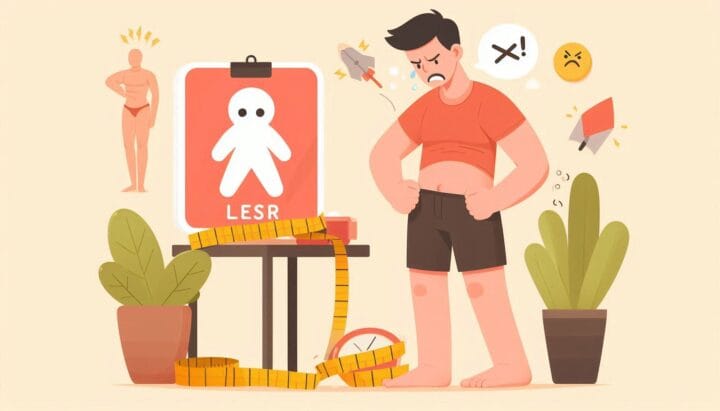Can Anxiety Cause Weight Gain? Unraveling the Connection
Table of Contents

Can Anxiety Cause Weight Gain? Unraveling the Connection
Ever noticed your pants feeling a bit tighter after a stressful week? You’re not alone. Many people wonder if anxiety can cause weight gain. The short answer? Yes, it can. But it’s not as simple as anxiety equals extra pounds. Let’s dive into this complex relationship and explore how you can manage both anxiety and your weight.
The Anxiety-Weight Connection: More Than Just Stress Eating
Anxiety and weight gain are like two dance partners, moving together in a complicated tango. It’s not just about reaching for that pint of ice cream when you’re feeling stressed (though that’s part of it). The connection runs deeper, involving hormones, behaviors, and even how your body processes food.
Think of anxiety as a puppeteer, pulling strings that affect various aspects of your life, including your weight. Sometimes the effects are obvious, like stress eating. Other times, they’re more subtle, like changes in your metabolism or sleep patterns.
The Cortisol Culprit: How Stress Hormones Impact Your Weight
Let’s talk about cortisol, the main stress hormone. When you’re anxious, your body pumps out cortisol like it’s going out of style. This isn’t necessarily bad in short bursts – it’s part of your body’s “fight or flight” response. But when anxiety keeps cortisol levels high for long periods, that’s when things get tricky.
High cortisol levels can:
- Increase your appetite, especially for high-calorie foods
- Slow down your metabolism
- Encourage fat storage, particularly around your midsection
It’s like your body is preparing for a long siege, storing up energy just in case. The problem? In our modern world, that siege rarely comes, leaving you with extra calories and nowhere to use them.
Anxiety-Induced Behaviors: The Habits That Pack on Pounds
Anxiety doesn’t just affect your body chemistry; it changes your behavior too. When you’re anxious, you might:
- Stress eat: Reaching for comfort foods high in sugar and fat
- Skip meals: Forgetting to eat or losing your appetite
- Avoid exercise: Feeling too drained or worried to work out
- Disrupt sleep: Tossing and turning, which messes with hunger hormones
These behaviors create a perfect storm for weight gain. It’s like anxiety is setting up roadblocks on your path to a healthy weight.
The Vicious Cycle: How Weight Gain Can Fuel More Anxiety
Here’s where things get really tricky. Gaining weight can actually increase anxiety, creating a frustrating cycle. You might worry about your appearance or health, leading to more stress, which in turn makes it harder to lose weight.
It’s like being stuck on a merry-go-round that you can’t get off. But don’t worry – there are ways to slow it down and eventually step off.
Breaking the Cycle: Strategies to Manage Anxiety and Weight
Now for the good news: you can tackle both anxiety and weight gain at the same time. Here are some strategies to help you break free from this cycle:
- Mindful eating: Pay attention to what and why you’re eating. Are you hungry, or just anxious?
- Regular exercise: Even a short walk can help reduce anxiety and boost metabolism
- Stress-reduction techniques: Try meditation, deep breathing, or yoga
- Healthy sleep habits: Aim for 7-9 hours of quality sleep each night
- Balanced diet: Focus on whole foods that nourish your body and mind
Think of these strategies as tools in your toolkit. You might not need all of them all the time, but it’s good to have options.
The Power of Small Changes: Little Steps for Big Results
Remember, you don’t have to overhaul your entire life overnight. Small, consistent changes can lead to big results over time. Maybe start with a five-minute walk each day, or swapping out one sugary snack for a piece of fruit.
It’s like planting a garden. You don’t see results immediately, but with consistent care, you’ll eventually have a flourishing ecosystem.
When to Seek Help: Recognizing When You Need Extra Support
Sometimes, managing anxiety and weight on your own can feel overwhelming. That’s okay – it’s normal to need help. Consider reaching out to a mental health professional or a registered dietitian if:
- Your anxiety is interfering with daily life
- You’re struggling with disordered eating patterns
- Weight changes are rapid or unexplained
- You feel stuck despite trying to make changes
Think of it like calling a mechanic when your car’s making a weird noise. Sometimes, you need an expert to help you get back on track.
The Role of Sleep in Anxiety and Weight Management
Let’s not forget about sleep – it’s a crucial player in both anxiety and weight management. Poor sleep can increase anxiety and mess with hormones that control hunger and fullness.
Tips for better sleep:
- Stick to a consistent sleep schedule
- Create a relaxing bedtime routine
- Limit screen time before bed
- Keep your bedroom cool and dark
Good sleep is like hitting the reset button for your body and mind. It can help reduce anxiety and regulate your appetite.
Nutrition Strategies: Eating to Manage Anxiety and Weight
What you eat can have a big impact on both anxiety and weight. Some foods can help calm anxiety, while others might make it worse.
Foods that may help reduce anxiety:
- Complex carbohydrates (like whole grains)
- Foods rich in omega-3 fatty acids (like salmon)
- Foods high in magnesium (like spinach and almonds)
Foods to limit:
- Caffeine
- Alcohol
- Highly processed foods
Think of food as fuel for your body and mind. The right fuel can help you run smoothly, while the wrong fuel can leave you sputtering.
The Importance of Self-Compassion in Your Journey
As you work on managing anxiety and weight, remember to be kind to yourself. Progress isn’t always linear, and setbacks are normal. Treat yourself with the same compassion you’d offer a friend.
Self-compassion isn’t just feel-good fluff – it’s a powerful tool. Research shows that people who practice self-compassion are more likely to maintain healthy habits long-term.
Conclusion
Can anxiety cause weight gain? Yes, it can. But now you know it’s not a simple cause-and-effect relationship. It’s a complex dance involving hormones, behaviors, and lifestyle factors. The good news is that by addressing your anxiety, you’re also taking steps to manage your weight, and vice versa.
Remember, small, consistent changes can lead to big results over time. Be patient with yourself, celebrate small victories, and don’t hesitate to seek help when you need it. You’ve got this!
FAQs
- Can anxiety medication cause weight gain?
Some anxiety medications can cause weight gain as a side effect. If you’re concerned, talk to your doctor about alternatives or strategies to manage your weight while on medication. - How quickly can anxiety lead to weight gain?
The timeline varies for each person. Some might notice changes within weeks, while for others, it might take months. Consistent, long-term anxiety is more likely to lead to significant weight changes. - Can losing weight help reduce anxiety?
For some people, yes. Losing weight through healthy methods can boost self-esteem and reduce physical symptoms that might trigger anxiety. However, it’s not a cure-all for anxiety disorders. - Is it possible to lose weight while dealing with anxiety?
Absolutely! While it can be challenging, many people successfully manage their weight while dealing with anxiety. The key is to address both issues simultaneously with healthy strategies. - How can I tell if my weight gain is due to anxiety or something else?
If you notice weight gain along with other anxiety symptoms (like excessive worry, sleep problems, or changes in appetite), anxiety might be a factor. However, it’s always best to consult with a healthcare provider for a proper assessment.














Post Comment